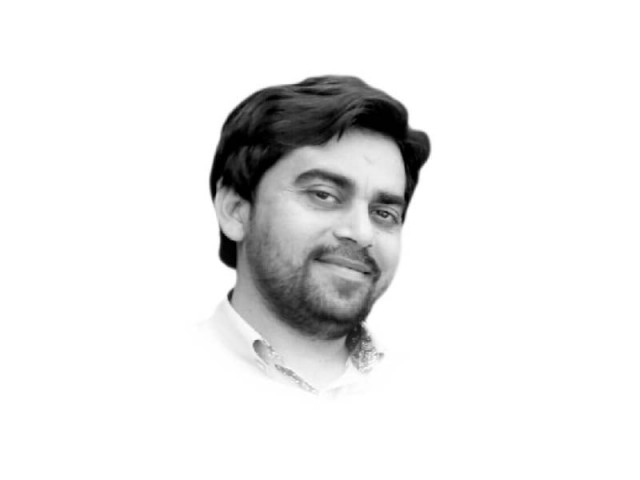Iqbal’s insight on the 21st century
Diyar-e-Maghrib ke rehne walo! khuda ki basti dukan nahin hai

Time moves on in three streams. The most familiar one is linear that keeps moving before it coalesces into a hypothetical timelessness — and practically it is this stream of time we flow with. The second stream is one with a poetic aura, which sustains both, our frustrations and our ideals. Yet, the two spans, however rival they may appear, are so inter-fused that they can never get into a rift. Together, they yoke the entire course of our life.
Yet, above the two, flows a third, more sublime stream of time: the apparently oxymoronic, mystic time. This time transcends the other two streams, the linear and the circular and by transcending them, it strives to seek the Eternal intuitively. Enlightened through its quest for its inspirations and ideals it comes down to illuminate the mundane by guiding about the unseen and otherwise unforeseeable. Iqbal, who sought to experience the sensation of time in all of its three manifestations reflected respectively in philosophy, poetry and intuition, continues to enlighten our world today.
Hadsa wo jo abhi parda-e-aflaak mein hai
Aks uss ka mere aaeena-e-idraak mein hai
(Events yet unfolded in the scroll of time
Reflect in the mirror of my perception
Tomorrow is still hidden in intention
But its dawn is flashing in my eyes)
We relate Iqbal to our time largely through his relevance to the creation of Pakistan and so remember him as a leading foundation of our political and cultural ideology. But, we seldom remember him for his insight into the global concerns of his time such as the World War II. And here we ignore a large portion of his vision, for our contemporary global reality is in fact a trailing legacy of the disarray of the Second World War. Interestingly, Iqbal couldn’t witness this war just as he didn’t live up to see the division of India. But, he had not only envisaged the growing rift in the European society much before this fissure eventually cracked open in the form of a disastrous war that took the lives of about 80 million people.
Dabaa rakha hai is ko zakhma-var ki tez-dasti ne
Bahot neeche suron mein hai abhi Europe ka wavaila
(Subdued by the dexterous fiddler’s chords there murmurs
In the lowest string the wail of Europe’s woe)
He could also see the ripples of this watershed drifting into the future. Pertinently, he also envisioned that any political resolution which lacks substance of a true ethical conception, however indispensable that resolution be to avoid the dismay, would breed another chaos, for he believed that a politics based on mere nationalism and even humanism which is devoid of the essence of religion and the spiritual, a true ethical conception, results ultimately in sheer tyranny.
And then we saw! The United Nations, which emerged as the only solution to ensure rapprochement among the war-torn countries and to safeguard the world from any transgressions in future, has now significantly tilted to serve the power politics — even so it still sustains our hope.
Similarly, with his deep understanding of Europe, he discerned, in his days, the nuances and subtleties of European culture and politics that came to be exposed manifestly in our time. The following verses which sum up his vision about the European society reflect what Europe is largely faced with at present.
Diyar-e-Maghrib ke rehne walo! khuda ki basti dukan nahin hai
Khara jise tum samajh rahe ho, wo ab zar-e-kam ayaar ho ga
Tumhari tehzeeb apne khanjar se ap hi khudkushi kare gi
Jo shakh-e-nazuk pe ashiyana bane ga, na paiydaar ho ga
(O Western world’s inhabitants, God’s world is not a shop!
What you are considering genuine will be regarded counterfeit
Your civilisation will commit suicide with its own dagger
The nest built on the weak branch will not be permanent)
First, these verses predict the decomposition of the European political and economic union, a process that started with increasing challenges for countries like Greece to fit themselves in the array, resulted in Brexit and currently waits for the separatist sentiment in Italy to emerge more palpable.
Secondly, his “Western world’s habitants” are from at least one angle, the European Muslims who, having sought their roots in European nationalism, stand appalled to see what ultimately stands before them today: the Hebdoian mafia getting unleashed onto the civilised Muslims, and Macron’s inanity being amplified amidst the hush by the rest of the European governments.
Today, the world continues to wrangle over either how to ease the growing political tensions or how to balance the power politics. Amidst the mayhem, Turkey celebrates the end of its 100 years of solitude. Iqbal, who initially mourned over the collapse of the Ottoman caliphate and then foresaw in this collapse signs for the emergence of another renaissance of Islam, visualised a luminous future for Turkey.
Agar Usmaniyon par koh-e-gham toota to kya gham hai?
Ke khoon-e-sadd hazar anjum se hoti hai sahar paida
(If a mountain of grief collapsed upon the Ottomans, then why lament?
For the dawn arises from the blood of a hundred thousand stars)
Turkey’s increasing expeditions expanding from the deserts of the east to the mountains of Caucasus, even under immense pressure on its political and economic fronts, reflect the growing re-attainment of its self-assurance Iqbal had envisaged at the fall of the Ottoman empire.
Published in The Express Tribune, November 11th, 2020.
Like Opinion & Editorial on Facebook, follow @ETOpEd on Twitter to receive all updates on all our daily pieces.














COMMENTS
Comments are moderated and generally will be posted if they are on-topic and not abusive.
For more information, please see our Comments FAQ